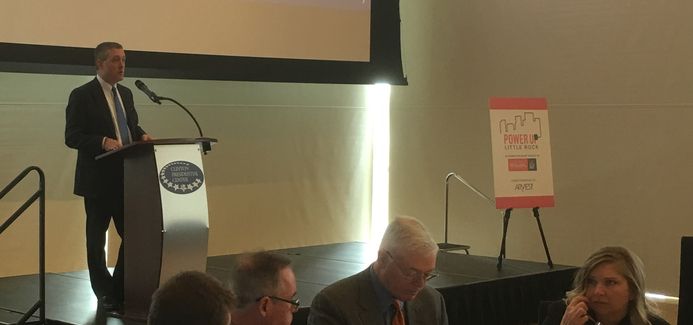St. Louis Fed chief talks Trump, tariffs and timing on interest rates
by January 10, 2019 3:08 pm 892 views

St. Louis Federal Reserve Bank President James Bullard in Little Rock.
St. Louis Federal Reserve Bank President James Bullard emphasized that a predicted global economic slowdown will create a pause in potential interest rate hikes and a need to closely monitor signals to a possible American and worldwide recession.
Speaking to an audience of Little Rock Chamber of Commerce members on Thursday (Jan. 10) at a partially-closed Clinton Presidential Library due to the government shutdown, Bullard walked through the past year’s economic “surprises” and offered thoughts on the current state of commercial activity in the nation’s Eighth Federal Reserve District and beyond. He said the tariff battles of the past year have reverberated in financial markets and economies around the globe.
“I think the trade war is very real and very tangible and my main comment on this is it’s causing uncertainty inside the U.S., which might be affecting business investments. However, it’s causing a lot more angst and uncertainty outside the U.S.,” said Bullard. “Investors abroad are not sure what’s going to happen, especially between the U.S. and China, and because of that they’re not sure how they should progress with their investment plans.”
This year, Bullard will be a voting member of the Fed’s Open Market Committee, which controls monetary policy for the nation, including the highly-watched fed funds rate. In the past year, the FOMC raised the rate — an interest rate that banks charge one another to loan money — four different times to the current 2.5% level. Bullard said he disagreed with the quarter-point December 2018 interest rate hike and that he’s not inclined to raising rates based on current data.
“I think for right now the right place for the policy rate is probably where we are and then we should react to incoming news on the economy,” Bullard said. “We should not be projecting that there are further rate increases to come. I don’t think that’s realistic in this environment and it sends a hawkish signal that I think is making markets think that inflation won’t hit the inflation target either in 2019 or beyond that.”
“I am concerned that we are on the precipice of a policy mistake here. We have normalized rates. I think we’re still okay today, but if we press too much harder going forward and substantially invert the yield curve that could presage a downturn in the U.S. and I think would possibly be very damaging at this stage,” he added.
Strong Gross Domestic Product (GDP) growth and low unemployment were a “surprise” to Bullard in the past year. He and other economists expected weaker GDP growth and slightly higher unemployment in 2018. Inflation has been “subdued,” he said, and Consumer Price Inflation (CPI), which is inflation minus energy and food spending, has been below the Fed’s two percent target.
TRUMP & THE SHUTDOWN
Bullard said the federal government partial shutdown is unlikely to do long-term damage to the economy. He noted that typically shutdowns do not last for long enough periods.
“Most of the estimates I’ve seen have been fairly minor, in terms of GDP,” said Bullard. “It could be that the next employment report would be affected by a government shutdown because you do have furloughed government employees, so the numbers there might be somewhat skewed.”
He expects when a resolution is achieved it will simply move income around to different months or quarters in a macroeconomic sense. Bullard did sympathize with those directly affected by the shutdown saying that it was a “hardship” for individuals losing their paychecks or services.
In Arkansas, Bullard said agricultural markets may be susceptible to suffer more quickly as a result of the shutdown, but he thinks the state’s largest economic sector will adjust.
“I think there can be all kinds of what I would call ‘major inconveniences’ for a whole host of people, but the question is does that add up to a big dent in the macroeconomy. Probably not, but we would like to see our government functioning more smoothly than this.”
With Bullard’s FOMC position this year, he’ll have a direct vote on influencing federal monetary policy. President Donald Trump has not been shy about voicing his opinions on how the Fed should conduct its business, particularly on interest rate adjustments.
Bullard said the president is just one of many voices who are unabashed in offering their criticisms and suggestions.
“He does comment and, in some ways, he’s very transparent about what he wants. But he’s not the only politician who comments on monetary policy,” Bullard said. “Senators comment during the Senate Banking Committee testimony and House members comment during the House Financial Services Committee meetings. We do get input from the political sphere.”
“He [Trump] has input over policy anyway because he makes appointments to the Federal Reserve Board — four out of the five on the Federal Reserve Board today are Trump appointees.
“The thing you have to keep in mind about the Federal Open Market Committee is that we have a Congressionally-approved mandate, which is to maintain stable prices and full employment. I think the committee structure works very well and is very much oriented towards achieving those goals,” said Bullard. “I welcome input from all channels.”
To view Bullard’s presentation in Little Rock, click here.
